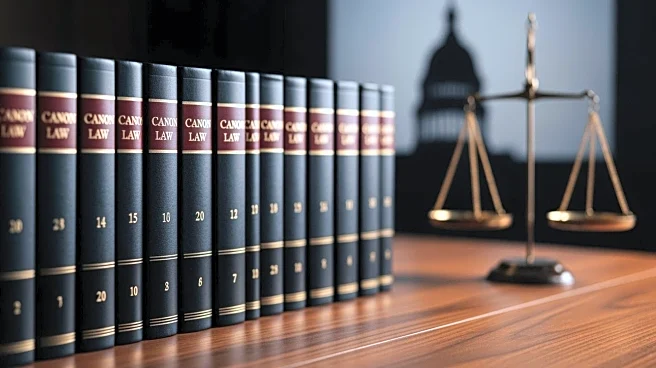What's Happening?
The presidential office under former President Yoon Suk Yeol and the Ministry of Foreign Affairs in South Korea are facing allegations of unlawful interference in the selection process of a law firm for a government-affiliated foundation. This foundation is responsible
for managing compensation for victims of Japan’s wartime forced labor. Democratic Party lawmaker Lee In-young has obtained documents suggesting that the Foundation for Victims of Forced Mobilization by Imperial Japan signed legal consulting contracts with two law firms, Shin & Kim and Barun, following the Yoon administration's third-party compensation plan unveiled in March 2023. This plan allowed a Korean foundation to pay damages on behalf of Japanese companies found liable for forced labor during Japan’s colonial rule of Korea from 1910 to 1945. However, some victims rejected the plan, arguing it absolved Japanese firms like Nippon Steel and Mitsubishi Heavy Industries, which had been ordered by Korean courts to compensate them. The foundation ended its contract with Shin & Kim and handed the work solely to Barun, reportedly reflecting the intention of the Foreign Ministry and the presidential office.
Why It's Important?
The allegations of interference in the law firm selection process raise significant concerns about the autonomy and integrity of public institutions in South Korea. If proven true, such actions could constitute a violation of the Act on the Management of Public Institutions, which guarantees the autonomy of public institutions to ensure responsible management. The potential abuse of power by the presidential office and the Foreign Ministry could undermine public trust in government operations and legal processes. This situation also highlights the ongoing tensions between South Korea and Japan regarding historical issues, which continue to affect diplomatic relations and public sentiment. The outcome of these allegations could have broader implications for how South Korea addresses historical grievances and manages its legal and diplomatic affairs.
What's Next?
Democratic Party lawmaker Lee In-young has called for an audit and criminal probe into the alleged interference, suggesting that the Office of the President and the Foreign Ministry may be guilty of abuse of power. The Anti-Corruption and Civil Rights Commission has responded to Lee's inquiry, indicating that improper solicitation may have occurred if a public official's request led to an illegal act. The Minister of the Interior and Safety, Yun Ho-jung, confirmed during a parliamentary audit that allegations of forged seals in court documents submitted by the foundation are true. These developments may lead to further investigations and potential legal actions against those involved, impacting the foundation's operations and South Korea's approach to historical compensation cases.
Beyond the Headlines
The allegations against the South Korean government offices could have deeper implications for the country's legal and ethical standards in handling historical compensation cases. The situation underscores the challenges in balancing diplomatic relations with Japan while addressing domestic demands for justice and accountability. It also raises questions about the transparency and accountability of government actions, potentially prompting discussions on reforming public institution management to prevent future interference. The case may influence public perception of the government's commitment to upholding legal principles and protecting the rights of victims of historical injustices.

















